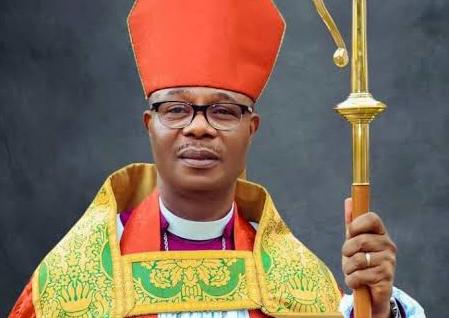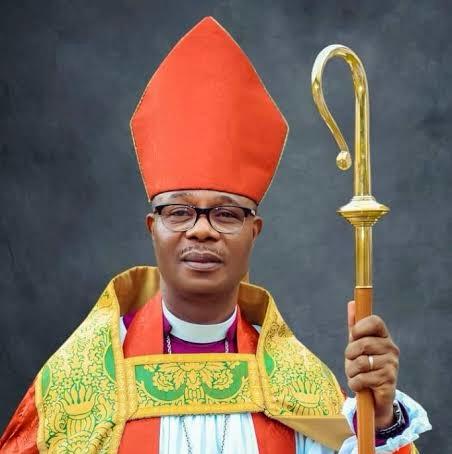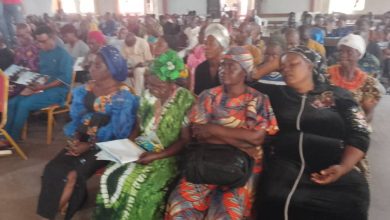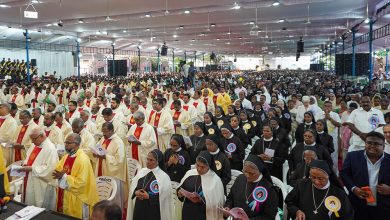Ecumenism is alive and well, says Ogunedo, Anglican Bishop of Mbaise Diocese

The Lord Bishop of the Anglican Communion, Diocese of Mbaise, the Rt. Rev Chamberlain Chinedum Ogunedo, JP, has commended the good people of Mbaise in Imo State for the tremendous support his Episcopal Ministry has received in the past 15 years of his assumption of office, and expresses hope for more solidarity in the years ahead.
According to him, the Diocese has, in the last 15 years, grown “spiritually, numerically, and infrastructurally, and continue to strive for excellence in serving the Lord.”

He admitted that there had been challenges, including spiritual apathy and financial constraints peculiar with rural Dioceses.”
“However, through prayer, collaboration with clergy and laity, and strategic planning, we have been able to reasonably overcome these challenges.”
On his vision for the future, His Lordship said it is to “see our Diocese become a hub for spiritual growth, education and community development.”
He said the vision centres on building a strong financial base for the Diocese and subordinate Churches “so that congregants will worship their God with lesser financial burdens.”
He also pledged to see to clergy development, youth empowerment, investments, and infrastructural enhancement.
Among the Bishop’s further commitment to education is the Diocese’s donation of land to the proposed University of Mbaise with main campus at Ife.
The groundbreaking was done on January 3, this year and construction of the Administrative Block is ongoing.
In the words of the Bishop: “We have already given our land as our own equity because we love education and would do everything worth doing to see it grow…to promote academic excellence, character development, and community engagement.”
Bishop Ogunedo fielded additional questions.
Your Lordship, could you please explain to Nigerians what informed your decision to become an Anglican Priest?
My journey to becoming an Anglican priest began with a deep sense of calling and purpose. Growing up in a Christian family, I was exposed to the teachings of Christ from a young age. As a choir boy, I took the front row of the procession, with specially made robes. However, it was during my teenage years that I felt a strong sense of conviction to serve the Lord. This led me to pursue theological studies and eventually, ordination. My faith journey has been shaped by prayer, mentorship, and service to others.
For 15 years, you have been in charge of affairs of the Diocese of Mbaise as the Lord Bishop. What would you say are the major challenges you face?
As the Anglican Bishop of Mbaise Diocese, we have faced numerous challenges, including spiritual apathy, financial constraints, and infrastructural development, which are peculiar with rural Dioceses. However, through prayer, collaboration with clergy and laity, and strategic planning, we have been able to reasonably overcome these challenges. Our Diocese has grown spiritually, numerically, and infrastructurally, and we continue to strive for excellence in serving the Lord.
Furthermore, the church must engage with contemporary issues while remaining faithful to its teachings. We encourage our members to be mindful of their cultural context while upholding Christian values. We are bent on biblical principle, having nothing to do with alternative lifestyles, which have become peculiar with the Western world. Our worship services blend tradition with relevance, ensuring that our faith remains vibrant and meaningful in today’s world.
This week your Diocese will hold the 3rd session of its 11th Synod. What is the significance of Synod to the Anglican communion?
Synod is the highest decision-making body of the Church, constituted by three Houses, namely: House of Bishop, House of Clergy, and House of Laity, to discuss and make decisions on matters affecting the Diocese. Categorically speaking, the Anglican Church is Synodically Governed and Episcopally led.
A Synod year takes three Calender years, each marked as a session of the very Synod at issue. It symbolises unity, collaboration, and shared responsibility in governance. As we prepare for the 3rd Session of our 13th Synod, I encourage all delegates to participate actively, sharing their insights and perspectives to build a stronger and more vibrant diocese.
What is your reaction to the way youths of this day view Church?
Some youths may view the Church as out of touch or hypocritical. We must demonstrate genuine faith, compassion, and integrity. Our clergy and laity must model Christ-like behaviour, and we must engage youths in meaningful ways, teach the vital skills, listen to their concerns and empower them to serve God, the Church and society.
What is the relationship between the Anglican Church and the Pentecostal Church?
The truth is that any Church that preaches the functions and work of the Holy Spirit, is Pentecostal. Anglican is Pentecostal and clear cut distinction should be made between that and new generation Churches. The “New generation Churches” often offer dynamic worship experiences and personalised attention. We use some likely approaches while emphasising our own strengths in liturgy, tradition, and community. Christian parents should nurture their children’s faith, encourage open dialogue, and model consistent Christian living.
Can you explain your vision for the Mbaise Diocese in the next 10 years?
This is actually our 15th year in the Episcopal Ministry. By the grace of God, we are on a mission to achieving some reasonable feat, some of which have been concluded, while some are in our long-term vision list, to be achieved in the years ahead. My vision for the next 10 years is to see our diocese become a hub for spiritual growth, education, and community development. The vision centres on building a strong financial base for the Diocese and subordinate Churches, so that congregants will worship their God with lesser financial burden. We shall focus on clergy development, youth empowerment, Investments, and infrastructural development, ensuring that our diocese remains a beacon of hope and service in Mbaise.
What role does the Diocese play in the proposed University of Mbaise?
The Diocese of Mbaise is major stakeholder and partner in the proposed University of Mbaise. We are excited about the University of Mbaise’s potential. The Church has a special interest in education and we have already given our land as our own equity, because we love education and would do everything worth doing to see it grow. Our Diocese will collaborate with the University to promote academic excellence, character development, and community engagement. We look forward to a fruitful partnership that benefits both the diocese and the University.
Can you speak on Ecumenism and Interfaith Relations as it relates to other denominations in Mbaise-land?
Ecumenism is alive and well. We enjoy a positive relationship with Ahiara Catholic Diocese and other denominations both in Mbaise and Imo State. We collaborate on issues of mutual concern. Let me assure you and Nigerians that as a Diocese we shall continue to foster unity among fellow Christians and people of other faith, working together to promote peace, justice, and the Gospel in Mbaise.





